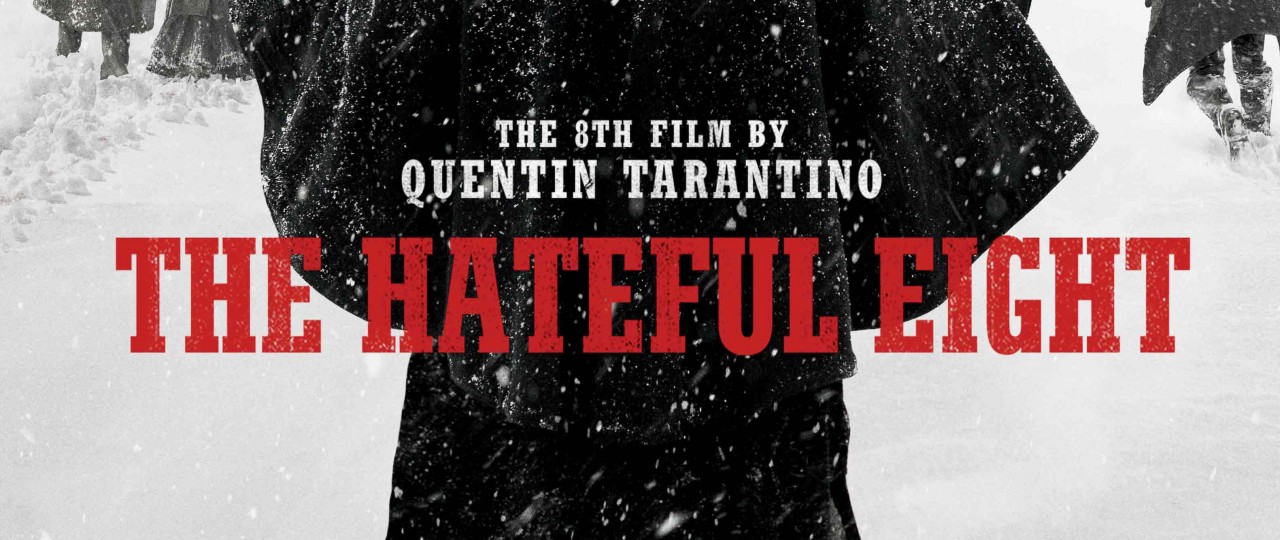Torn by Tarantino
Any regular cinema-goer will have been acutely aware for some time that ‘The 8th film from Quentin Tarantino’ was out this month. This was another western (following on from Django Unchained) and so I settled down with a fair idea of what I was going to get. It was a violent, dark, bloated, ensemble western with a lot of bloodshed and even more talking.
Samuel Jackson once again proved what a magnetic screen presence he can be and Walton Goggins finally has a role to showcase his talents. Only Tarantino can get performances from veterans like Jackson and write roles like Jules Winfield that burn into the public consciousness.
Somehow harking back to the chamber drama of Reservoir Dogs, the film served up what was largely one extended scene painted in strokes at once epic and intimate. The intermission cut the film into two distinct sections: the second half saw the all the moving parts of the first click into place. While many individual scenes clearly exist only for the dialogue, the dialogue does crackle. Also for once, there does seem to be some political and social subtext regarding racial and gender politics.
Nevertheless, the same old reservations I have about Tarantino still remain. The issues evident from Kill Bill through to Django Unchained and now Hateful Eight persist and to my mind at least, show no sign of abating. There were bold stylistic leaps from Reservoir Dogs to Pulp Fiction. Those leaps continued with Jackie Brown except there we had added heart. It was a story coloured with emotion and depth and for the first time in his oeuvre, there were actual people in it. But as a filmmaker, there the development stopped. Jackie Brown would seem to be his zenith (at this point). I would like to tentatively suggest two reasons.
Firstly, Tarantino badly needs an editor. For now he can do whatever he wants. Without challenge. One caveat is that undeniably Tarantino has a truly original voice and in an era saturated with CGI’d robots, dinosaurs and blue people, he is a cinephile writ large in contemporary cinema. He is not swayed by trends and is deeply respectful towards the traditions of the medium. That he has the license to do and make whatever he wants yet remain unique and almost classicist should be celebrated.
However, the question remains whether pure Tarantino is always a good thing. Can it ever be too much? The lack of a challenging voice has resulted in increasing levels of self-indulgence. This started with Kill Bill, during which he became a parody of himself during Bill’s Superman monologue in part 2 for example. The last hour of Django was excruciating and once again, he danced with insurality during that last third by casting himself and then taking another hour to draw it to a close.
Martin Scorsese has worked with his editor Thelma Schoonmaker for goodness knows how long. He has proved time and time again that a good editor is priceless. His films rarely feel stretched out (with exceptions of course) and understands what you need to tell a story….and what you don’t.
The question remains whether pure Tarantino is always a good thing. Can it ever be too much?
The lack of an editor has also highlighted his limitations as a storyteller. With each passing film, it has become increasingly apparent that Tarantino is extremely skilled in writing scenes. Very few can write with his ear and with such linguistic dexterity. The interrogation scene at the start of Inglourious Basterds is just one example of his peerless ability to raise tension to unbearable levels, with words alone. Yet as a storyteller, he remains unconvincing.
The only film against which this cannot be levelled is Jackie Brown. Tarantino adapted this brilliantly from Elmore Leonard’s novel Rum Punch so it ultimately remains someone else’s story. He has appeared prickly occasionally when this is put to him, saying that ‘it is easy to say Jackie Brown is my best film’. Each film since Kill Bill has outstayed its welcome. In each there are great things. But the issue for me is that they are remembered for individual moments rather than the whole.
The second issue is that I would love to see a little more heart in his films. The reference point for me is the films of Paul Thomas Anderson. I only draw this comparison because Tarantino himself has. In an interview in Sight and Sound he claimed that they inspire each other to make better films. To put it simply, in Magnolia, Boogie Nights, Punch Drunk Love and arguably Inherent Vice, Anderson has made films brimming with humanity and pathos in ways the films of Tarantino can only dream about.
With regards to Anderson, his films are technically daring and artistically bold but they are anchored in rich characters, moments of tenderness and redemption. The two filmmakers pose rather different questions of their audience but when you approach subjects such as slavery and justice, people are entitled to ask for a little more.
When you approach subjects such as slavery and justice, people are entitled to ask for a little more.
So I remain torn. There are lots to admire, of that there can be no doubt. Once the flames of self-publicity have died away and the event of a Tarantino movie has slipped from view, what are we left with? I’m not sure we are left with a lot. Possibly just the memory of a once-great filmmaker who now only yearns to see reflections of himself in the reels.
